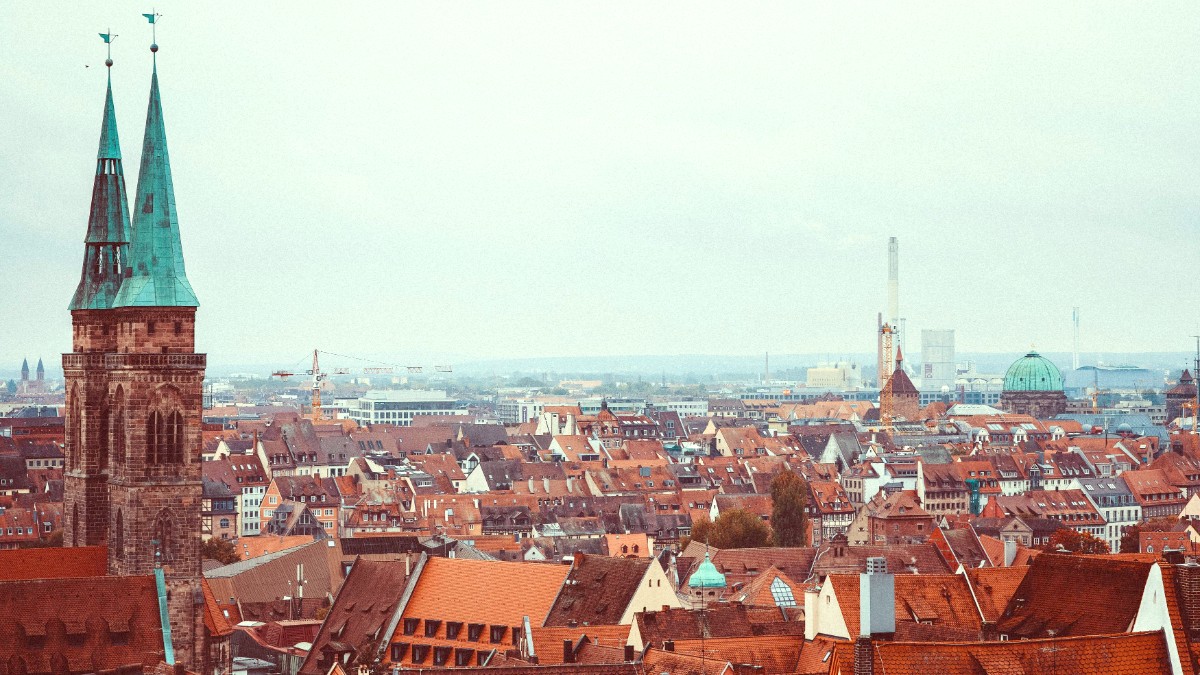
Bavaria, Germany
Nuremberg's appeal changes with the seasons, influencing crowds, prices, and available experiences.
Spring (March-May): Temperatures are mild, typically ranging from 5°C to 18°C (41°F to 64°F). Rainfall is moderate, and the city begins to bloom, with fresh greenery and colorful flowers. This shoulder season is a pleasant time for sightseeing with fewer crowds than summer. Early spring can still be cool, so layering clothing is good. Late spring has longer daylight hours and warmer, more stable weather. The air feels crisp and invigorating.
While Nuremberg does not experience monsoons or hurricanes, other weather aspects are important. Winters include significant snowfall and icy conditions, impacting travel on foot or by car. Summers can have occasional heatwaves, making hydration and seeking shade important. Heavy thunderstorms can also occur in summer, often with sudden downpours.
January and February are the coldest months, with fewer tourists and quieter streets.
June-August & December
Warmest weather, full attraction schedules, unparalleled Christmas market atmosphere. The city is with holiday cheer and lights.
Highest prices for accommodation and flights. Popular sites and the Christmas Market have large crowds; patience and advance booking are necessary.
April-May & September-October
Pleasant temperatures for walking. Fewer crowds than peak season, with more moderate prices for accommodation and flights. Spring with blooming flowers; autumn with beautiful foliage. Ideal for those desiring good weather without peak season crowds.
Weather can be unpredictable, with cooler days or sudden rain showers possible. Some outdoor attractions might have reduced hours. Certain events may not be running.
January-March & November
Lowest prices for flights and accommodation. Fewest crowds, for relaxed museum and indoor attraction exploration. Higher chance of snow-covered landscapes, creating serene beauty. The city feels more local.
Coldest time of year, with shorter daylight hours. Some outdoor attractions or seasonal businesses may be closed. November, before the Christmas Market, can be notably grey and wet, without December's festive cheer. Warm layering is absolutely necessary.
While Nuremberg does not experience monsoons or hurricanes, other weather considerations are important. Winters can bring significant snowfall and icy conditions, impacting travel on foot or by car. Summers can have occasional heatwaves, making proper hydration and seeking shade important. Heavy thunderstorms can also occur in summer, often with sudden downpours.
Museums and indoor attractions are enjoyable year-round. They become especially appealing options for colder or rainy days, specifically during the low season when crowds are smaller.
This renowned event runs from late November until December 24th. A trip for this festive market is in this specific window.
June to September offers the best weather for exploring the Old Town on foot, enjoying outdoor cafes, and relaxing in Nuremberg's traditional beer gardens.
The months from May to September have comfortable temperatures for exploring the city's green spaces and the surrounding Franconian countryside by bike or on foot.
Germany is a member of the Schengen Area, which means it shares a common visa policy with 26 other European countries. These requirements vary based on your nationality and the length and purpose of your stay.
For most tourists, the relevant visa types are either a short-stay Schengen visa or visa-exempt entry.
Regardless of your visa status, you must present specific documents upon arrival in Germany.
Costs vary significantly based on your travel style, from budget-conscious backpacking to a luxury experience. This section has a clear breakdown to help you manage your expenses.
Nuremberg is a generally safe city with a high standard of healthcare.
No specific vaccinations are necessary for entry into Germany for general tourism.
Make certain your routine vaccinations (MMR, DTP, Polio, Chickenpox) are up-to-date.
Consult your doctor or a travel clinic 4-6 weeks before your trip for personalized advice.
Prevention is good.
Seasonal Allergies: Pollen counts are high in spring and summer. Pack your usual allergy medication.
Cold/Flu: Common in winter. Practice good hand hygiene, like frequent hand washing or using hand sanitizer. Sunburn: Summer sun is strong. Use Sunscreen with high SPF, wear a hat, and seek shade. Dehydration: Stay hydrated. Carry a Reusable water bottle. Blisters: Extensive walking on cobblestone streets. Wear comfortable shoes and carry blister plasters in your First aid kit.
Germany has an excellent healthcare system. Hospitals (Krankenhäuser) and pharmacies (Apotheken) are modern and well-equipped.
Many doctors in larger cities speak English. Pharmacies, marked with a red "A" or green cross, offer over-the-counter medications.
These numbers function from any phone, free of charge.
Nuremberg is generally a very safe city. The overall crime rate is low.
Travel insurance is highly recommended for all travelers to Germany, even if not necessary for your visa.
A comprehensive policy covers Medical Emergencies, Emergency Evacuation, Trip Cancellation/Interruption, and Loss/Theft of Belongings.
Emergency Medical/Ambulance/Fire: 112. Police: 110. For lost/stolen credit cards, use your bank's global hotlines.
Locate your country's embassy or nearest consulate in Germany (e.g., US Consulate General in Munich). Note their emergency contact numbers.